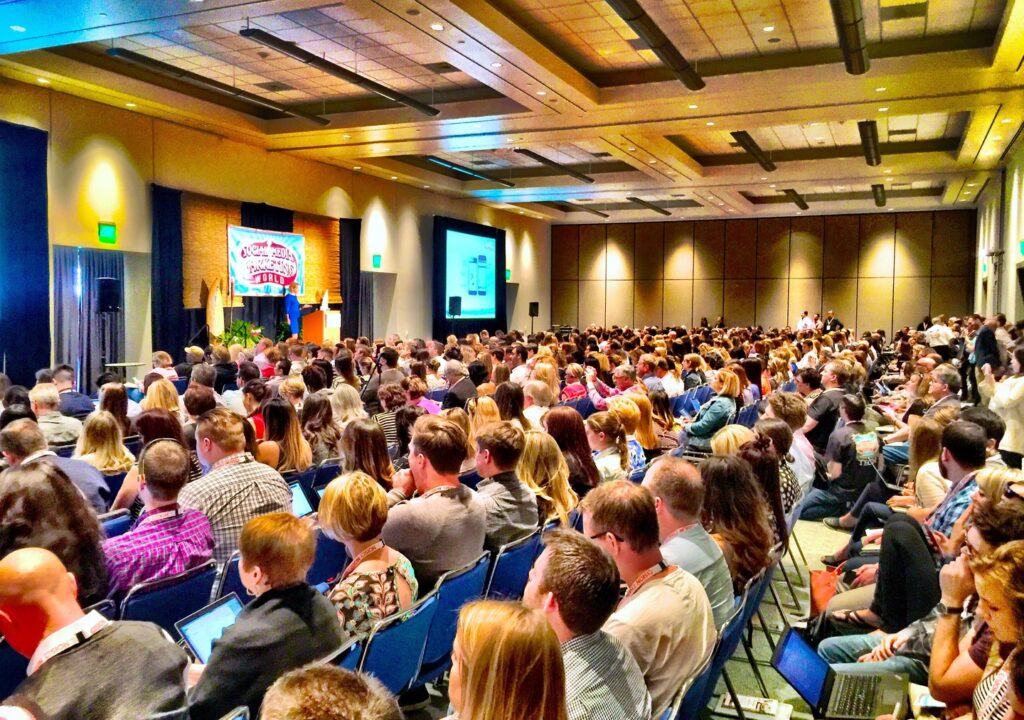
By incorporating big data analytics into the event industry, organisers have not only transformed their approach to planning, executing, and evaluating events but also reaped significant practical benefits. This shift is gaining momentum as real-time data collection tools and analytics platforms become more accessible and advanced. The use of big data empowers event organisers to delve into attendee behaviours and preferences, enabling them to craft experiences more precisely and enhance future events, thereby directly impacting their work and the success of their events.
Author: Johanna Heinonen
Importance and Application of Data-Driven Decision-Making
The value of real-time data collection during events is immense, particularly in its potential to enhance attendee experiences. It allows organisers to track various metrics, such as attendee engagement levels, session popularity, and movement patterns within the venue. This data, collected through multiple means, including mobile apps, RFID tags, social media interactions, and attendee surveys, provides actionable insights that can significantly improve attendees’ experience and optimise event logistics. This fosters a sense of satisfaction and loyalty among the attendees, painting a hopeful picture of the future of event experiences.
For example, understanding which sessions or activities are most popular can help organisers allocate resources more efficiently and improve content offerings. Additionally, analysing attendee feedback and engagement patterns can lead to more personalised and engaging event experiences, increasing attendee satisfaction and loyalty (Howarth 2024).
Academic studies have robustly underlined the significance of data-driven decision-making in the event industry, providing a solid foundation for its credibility. According to Gajdošík (2019), big data analytics can significantly improve event management by providing detailed insights into consumer behaviour, which can enhance marketing strategies and operational efficiency. Their research not only underscores the effectiveness of big data in leading to better-targeted marketing efforts and improved attendee retention rates but also instils confidence in the power of data-driven decision-making.
Moreover, Buhalis and Amaranggana (2015) discuss the role of intelligent tourism technologies, including data analytics, in creating more interactive and personalised experiences for event attendees. They emphasise that real-time data allows for dynamic adjustments during events, leading to a more responsive and satisfactory experience for participants.
In another study, Gretzel et al. (2015) explore the impact of big data on the tourism and hospitality industry, noting that data-driven insights can lead to more strategic decision-making and competitive advantage. They argue that the ability to analyse large datasets and extract meaningful patterns is crucial for understanding market trends and consumer preferences, which are directly applicable to the event industry.
Measuring the Impacts of Events for Socio-Cultural, Economic, and Ecological Sustainability
The impact of events extends beyond immediate economic benefits, encompassing socio-cultural and ecological dimensions that contribute to sustainable development. Accurate measurement of these impacts is essential for ensuring that events provide short-term gains and contribute positively to long-term sustainability goals.
Events can significantly influence the social and cultural fabric of host communities. They can foster social cohesion, enhance cultural heritage, and promote community pride. Measuring these impacts involves assessing changes in community engagement, cultural participation, and preserving local traditions. Surveys and interviews with residents and stakeholders can provide valuable insights into how events affect social dynamics and cultural vitality (Richards 2018).
Economic impacts are often the most immediate and visible benefits of events. These include direct spending by attendees, job creation, and the stimulation of local businesses. However, long-term economic sustainability also involves evaluating how events contribute to the resilience and diversification of the local economy. This can be measured through economic impact studies, which assess variables such as income generation, employment rates, and business growth over time (Getz 2012).
The ecological footprint of events is critical to their overall sustainability. Measuring environmental impacts involves tracking resource consumption, waste generation, and carbon emissions associated with event activities. Life cycle assessments and carbon footprint calculators can help quantify these impacts. Additionally, implementing and monitoring sustainable practices, such as waste reduction initiatives, energy efficiency measures, and using renewable resources, are essential for minimising the environmental footprint of events (Mair & Jago 2010).
To comprehensively assess the sustainability of events, it is crucial to integrate socio-cultural, economic, and ecological metrics into a unified evaluation framework. This holistic approach not only enables event organisers to understand the interconnected nature of these impacts but also instils confidence in their ability to make informed decisions that balance the various dimensions of sustainability. For instance, incorporating sustainability indicators into the event planning process can help identify potential trade-offs and synergies between sustainability goals, providing a comprehensive and reassuring view of the event’s impact.
Measuring the impact in South Carelia
The South Karelia Event Cluster (EKTAK) project, co-ordinated by LAB University of Applied Sciences, an ERDF initiative, aligns with contemporary approaches to data-driven decision-making and comprehensive impact measurement in the event industry. EKTAK measures community engagement, cultural participation, and the preservation of local traditions, similar to academic approaches that emphasise fostering social cohesion and cultural heritage (Richards 201). The project evaluates attendee spending, job creation, and local business stimulation, aligning with studies highlighting the significance of economic benefits and long-term sustainability (Getz 2012). EKTAK tracks environmental metrics like CO2 emissions and resource consumption, reflecting the academic focus on minimising the environmental footprint through sustainable practices.
EKTAK ensures data relevance through tailored surveys and long-term data access until 2026, facilitating ongoing analysis and informed decision-making with the help of Salmiplatform. It also emphasises stakeholder engagement for improved event management. The EKTAK project exemplifies the integration of data-driven decision-making and comprehensive impact measurement, enhancing the sustainability and effectiveness of events by focusing on economic, socio-cultural, and ecological dimensions.
References
Buhalis, D. & Amaranggana, A. 2015. Smart tourism destinations enhance the tourism experience through the personalisation of services. In Information and Communication Technologies in Tourism 2015: Proceedings of the International Conference in Lugano, Switzerland. February 3-6, 2015. Pp. 377-389. Springer International Publishing. Cited 11.6.2024. Available at https://doi.org/10.1007/978-3-319-14343-9_28
Carlsen, J., Getz, D. & Soutar, G. (2000). Event Evaluation Research. Event Management. 6(4), 247–257. Cited 11.6.2024. Available at https://doi.org/10.3727/152599500108751408
Getz, D. 2012. Event studies: Theory, research and policy for planned events. 2nd ed. Routledge.
Gretzel, U., Sigala, M., Xiang, Z. & Koo, C. 2015. Smart tourism: foundations and developments. Electronic Markets. 25(3), 179–188. Cited 11.6.2024. Available at https://doi.org/10.1007/s12525-015-0196-8
Gajdošík, T. 2019. Big Data Analytics in Smart Tourism Destinations. A New Tool for Destination Management Organizations? Springer Proceedings in Business and Economics. 15–33. Cited 11.6.2024. Available at https://doi.org/10.1007/978-3-030-03910-3_2
Howarth, J. 2024. 7 Top Event Industry Trends. 2024. Exploding Topics. 30.5.2024. Cited 11.6.2024. Available at https://explodingtopics.com/blog/event-industry-trends
Mair, J. & Jago, L. 2010. The development of a conceptual model of greening in the business events tourism sector. Journal of Sustainable Tourism. 18(1), 77–94. Cited 11.6.2024. Available at https://doi.org/10.1080/09669580903291007
Richards, G. 2018. Cultural tourism: A review of recent research and trends. Journal of Hospitality and Tourism Management. 36, 12–21. Cited 11.6.2024. Available at https://doi.org/10.1016/j.jhtm.2018.03.005
Author
Johanna Heinonen works as a senior lecturer and RDI specialist at LAB University of Applied Sciences. In particular, the diverse development of tourism, digital communication and customer experience are close to her heart. In the EKTAK project, she works as an RDI specialist and is responsible for educational cooperation.
Illustration: https://pxhere.com/en/photo/489447 (CC0)
Published 20.6.2024
Reference to this article
Heinonen, J. 2024. Data-Driven Decision-Making and Measuring Impacts in the Event Industry. LAB Pro. Cited and the date of citation. Available at https://www.labopen.fi/lab-pro/data-driven-decision-making-and-measuring-impacts-in-the-event-industry/







